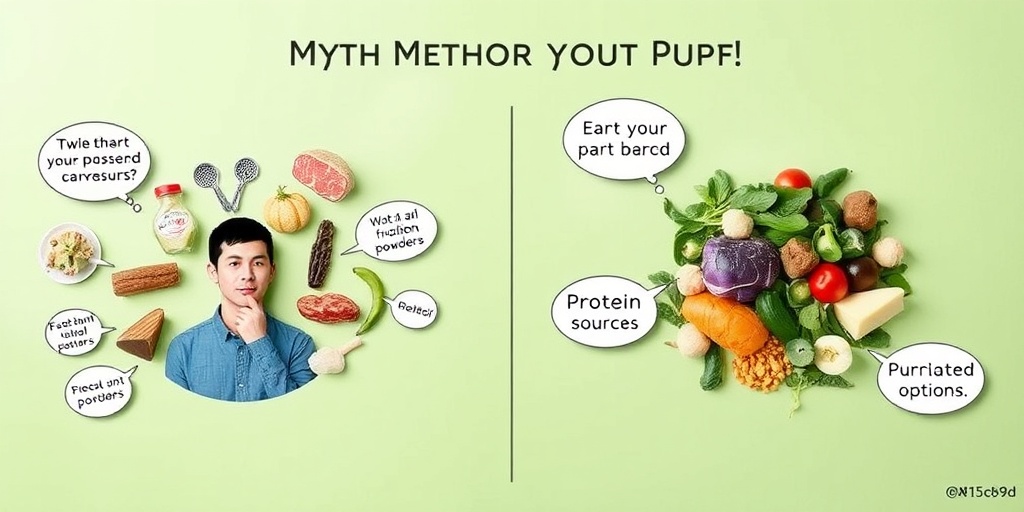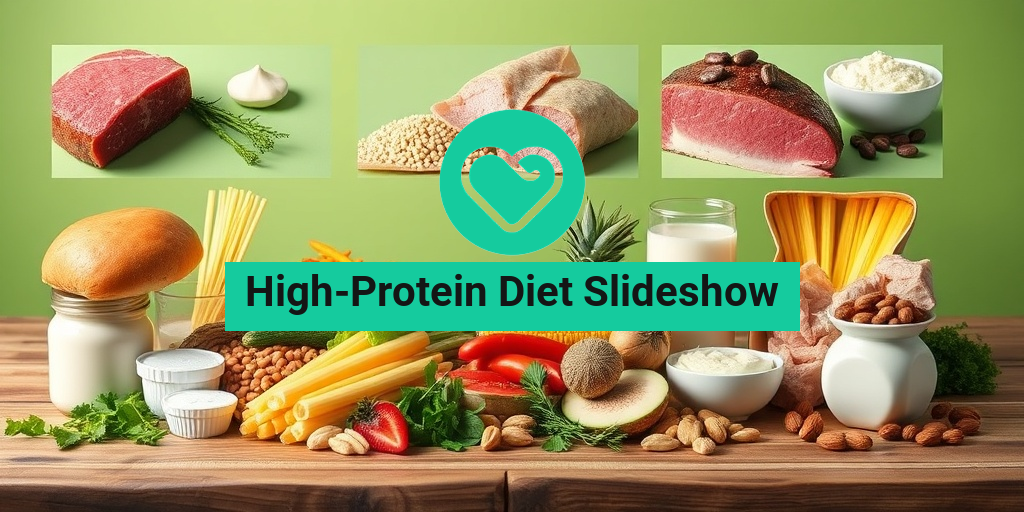What Is a High-Protein Diet?
A high-protein diet is a dietary plan that emphasizes the consumption of protein-rich foods while reducing the intake of carbohydrates and fats. This type of diet typically includes a variety of protein sources such as meat, fish, eggs, dairy products, legumes, and nuts. The primary goal of a high-protein diet is to increase protein intake to support muscle growth, weight loss, and overall health.
How Does It Work?
When you consume protein, your body breaks it down into amino acids, which are the building blocks of muscles and tissues. A high-protein diet can help you feel fuller for longer, which may reduce overall calorie intake. Additionally, protein has a higher thermic effect compared to fats and carbohydrates, meaning your body burns more calories digesting protein-rich foods.
Who Should Consider a High-Protein Diet?
A high-protein diet can be beneficial for various groups of people, including:
- Athletes and Bodybuilders: To support muscle repair and growth.
- Individuals Looking to Lose Weight: To promote satiety and reduce cravings.
- Older Adults: To help maintain muscle mass and strength as they age.
However, it’s essential to consult with a healthcare professional or a registered dietitian before making significant dietary changes, especially if you have underlying health conditions.
Benefits of High-Protein Diet
Adopting a high-protein diet can offer numerous health benefits. Here are some of the most notable advantages:
1. Supports Weight Loss
One of the most significant benefits of a high-protein diet is its potential to aid in weight loss. Protein-rich foods can help you feel full and satisfied, reducing the likelihood of overeating. Studies have shown that individuals on high-protein diets tend to consume fewer calories overall, leading to effective weight management.
2. Promotes Muscle Growth and Repair
For those engaged in regular physical activity, especially strength training, a high-protein diet is crucial. Protein provides the necessary amino acids for muscle repair and growth. This is particularly important for athletes and fitness enthusiasts who aim to enhance their performance and recovery.
3. Boosts Metabolism
Protein has a higher thermic effect than fats and carbohydrates, meaning your body burns more calories digesting protein. This can lead to an increase in your overall metabolic rate, making it easier to maintain or lose weight.
4. Enhances Bone Health
Contrary to the myth that high-protein diets can harm bone health, research suggests that adequate protein intake is essential for maintaining strong bones. Protein helps in the absorption of calcium and other minerals, contributing to better bone density.
5. Regulates Blood Sugar Levels
A high-protein diet can help stabilize blood sugar levels by slowing down the absorption of glucose into the bloodstream. This can be particularly beneficial for individuals with insulin resistance or type 2 diabetes, as it may help manage their condition more effectively.
6. Improves Heart Health
While some may worry that high-protein diets could lead to heart issues, many protein sources, such as fish, legumes, and nuts, are heart-healthy. These foods provide essential nutrients and healthy fats that can improve cardiovascular health.
Incorporating a high-protein diet into your lifestyle can be a game-changer for your health. If you’re looking for more personalized advice or meal plans, consider visiting Yesil Health AI for evidence-based health answers tailored to your needs.
In conclusion, a high-protein diet can offer a multitude of benefits, from weight loss to improved muscle health. By focusing on quality protein sources and balancing your overall diet, you can achieve your health goals while enjoying delicious meals! 🍽️

High-Protein Foods to Include
When embarking on a high-protein diet, it’s essential to know which foods to incorporate into your meals. High-protein foods not only help in muscle building but also keep you feeling full longer, making them a great choice for anyone looking to manage their weight or improve their overall health. Here’s a list of some of the best high-protein foods you should consider including in your diet:
1. Lean Meats
- Chicken Breast: A staple in many high-protein diets, chicken breast is low in fat and high in protein, making it an excellent choice for muscle repair and growth.
- Turkey: Similar to chicken, turkey is another lean meat that provides a significant protein boost without excess calories.
- Lean Cuts of Beef: Cuts like sirloin or tenderloin are rich in protein and iron, essential for energy and muscle function.
2. Fish and Seafood
- Salmon: Not only is salmon high in protein, but it also contains omega-3 fatty acids, which are beneficial for heart health.
- Tuna: A convenient option, canned tuna is packed with protein and can be easily added to salads or sandwiches.
- Shrimp: Low in calories and high in protein, shrimp is a delicious seafood option that cooks quickly.
3. Dairy Products
- Greek Yogurt: This creamy treat is not only high in protein but also contains probiotics, which are great for gut health.
- Cottage Cheese: A versatile ingredient, cottage cheese can be eaten alone or added to smoothies for an extra protein kick.
- Cheese: While cheese can be high in fat, options like mozzarella or feta can provide protein without too many calories.
4. Plant-Based Proteins
- Legumes: Beans, lentils, and chickpeas are excellent sources of protein and fiber, making them perfect for vegetarian or vegan diets.
- Quinoa: This grain is unique because it contains all nine essential amino acids, making it a complete protein source.
- Nuts and Seeds: Almonds, chia seeds, and pumpkin seeds are not only high in protein but also provide healthy fats.
5. Protein Supplements
- Protein Powders: Whey, casein, or plant-based protein powders can be a convenient way to increase your protein intake, especially post-workout.
- Protein Bars: Look for bars with minimal added sugars and high protein content for a quick snack on the go.
Incorporating these high-protein foods into your meals can help you achieve your dietary goals while keeping your meals exciting and satisfying. 🍗🥦
High-Protein Diet for Weight Loss
A high-protein diet can be an effective strategy for weight loss. By increasing your protein intake, you can enhance your metabolism, reduce appetite, and promote fat loss while preserving lean muscle mass. Here’s how a high-protein diet can aid in your weight loss journey:
1. Increased Satiety
Protein is known to be more satiating than carbohydrates or fats. This means that when you consume a high-protein meal, you’re likely to feel fuller for longer, which can help reduce overall calorie intake. Studies have shown that individuals on high-protein diets tend to eat fewer calories throughout the day. 🍽️
2. Enhanced Metabolism
Digesting protein requires more energy than digesting fats or carbohydrates. This phenomenon, known as the thermic effect of food (TEF), means that your body burns more calories processing protein-rich foods. By incorporating high-protein foods into your diet, you can boost your metabolism and aid in weight loss.
3. Muscle Preservation
When losing weight, it’s crucial to maintain lean muscle mass. A high-protein diet helps preserve muscle while promoting fat loss, ensuring that the weight you lose comes primarily from fat rather than muscle. This is particularly important for those who engage in regular exercise or strength training.
4. Balanced Meal Planning
Creating a high-protein diet menu can be simple and enjoyable. Focus on including a source of protein in every meal and snack. Here’s a sample meal plan:
- Breakfast: Scrambled eggs with spinach and feta cheese.
- Lunch: Grilled chicken salad with mixed greens and chickpeas.
- Dinner: Baked salmon with quinoa and steamed broccoli.
- Snacks: Greek yogurt with berries or a handful of almonds.
By following a high-protein diet, you can effectively support your weight loss goals while enjoying a variety of delicious foods. Remember to stay hydrated and combine your diet with regular physical activity for the best results! 💪🥗

High-Protein Meal Ideas
Embarking on a high-protein diet can be both exciting and delicious! Whether you’re looking to build muscle, lose weight, or simply maintain a healthy lifestyle, incorporating protein-rich meals into your daily routine is essential. Here are some scrumptious meal ideas that are not only high in protein but also easy to prepare.
Breakfast Options
- Greek Yogurt Parfait: Layer Greek yogurt with fresh fruits and a sprinkle of granola for a nutritious start to your day. Greek yogurt is packed with protein, making it a perfect breakfast choice! 🍓
- Protein Pancakes: Whip up pancakes using protein powder, oats, and egg whites. Top them with nut butter or fresh berries for added flavor and nutrition.
- Egg and Spinach Scramble: Sauté spinach and mix it with scrambled eggs or egg whites. This dish is not only high in protein but also loaded with vitamins!
Lunch Ideas
- Quinoa Salad: Combine cooked quinoa with black beans, corn, diced peppers, and a squeeze of lime. Quinoa is a complete protein, making it an excellent choice for a filling lunch. 🥗
- Grilled Chicken Wrap: Fill a whole-grain wrap with grilled chicken, mixed greens, and your favorite veggies. Add a light dressing for extra flavor!
- Tuna Salad: Mix canned tuna with Greek yogurt, diced celery, and onions. Serve it on whole-grain bread or over a bed of greens for a protein-packed meal.
Dinner Delights
- Salmon with Asparagus: Grill or bake salmon fillets and serve them with roasted asparagus. Salmon is rich in protein and omega-3 fatty acids, making it a heart-healthy choice. 🐟
- Beef Stir-Fry: Sauté lean beef strips with a variety of colorful vegetables. Serve over brown rice or quinoa for a satisfying dinner.
- Chickpea Curry: Cook chickpeas with coconut milk, tomatoes, and spices for a hearty vegetarian option. Chickpeas are an excellent source of plant-based protein!
Snacks to Keep You Full
- Hard-Boiled Eggs: A simple and portable snack that’s rich in protein. Perfect for on-the-go munching! 🥚
- Protein Bars: Choose bars that are low in sugar and high in protein for a quick energy boost.
- Edamame: Steamed edamame pods are not only fun to eat but also provide a good amount of protein and fiber.
Common Myths About Protein
Despite the growing popularity of high-protein diets, several myths persist that can lead to confusion. Let’s debunk some of the most common misconceptions about protein.
Myth 1: You Can Only Get Protein from Meat
Many people believe that meat is the only source of protein. However, this is far from the truth! There are numerous plant-based sources of protein, including beans, lentils, quinoa, nuts, and seeds. Incorporating these foods into your diet can provide ample protein without relying solely on animal products. 🌱
Myth 2: High-Protein Diets Are Bad for Your Kidneys
Another common myth is that high-protein diets can harm kidney function. While individuals with pre-existing kidney conditions should consult their healthcare provider, research shows that healthy individuals can safely consume higher amounts of protein without adverse effects.
Myth 3: More Protein Equals More Muscle
While protein is essential for muscle growth, consuming excessive amounts won’t automatically lead to increased muscle mass. It’s crucial to balance protein intake with regular strength training and a well-rounded diet. Remember, moderation is key! 💪
Myth 4: All Protein Sources Are Equal
Not all protein sources are created equal. Animal proteins typically contain all essential amino acids, while many plant proteins may lack one or more. Combining different protein sources, such as beans and rice, can help ensure you get a complete amino acid profile.
Understanding these myths can help you make informed decisions about your high-protein diet. By incorporating a variety of protein sources and debunking misconceptions, you can enjoy the benefits of a protein-rich lifestyle!

Potential Risks of High-Protein Diet
While a high-protein diet can offer numerous benefits, such as weight loss and muscle gain, it’s essential to be aware of the potential risks associated with this dietary approach. Understanding these risks can help you make informed decisions about your nutrition and health.
1. Kidney Strain
One of the most discussed concerns regarding a high-protein diet is its impact on kidney health. High protein intake can increase the workload on your kidneys, especially in individuals with pre-existing kidney conditions. This can lead to further complications if not monitored properly. If you have kidney issues, it’s crucial to consult with a healthcare professional before significantly increasing your protein intake.
2. Nutrient Deficiencies
Focusing heavily on protein can sometimes lead to a lack of essential nutrients. When you prioritize protein-rich foods, you may inadvertently reduce your intake of fruits, vegetables, and whole grains, which are vital for overall health. This can result in deficiencies in vitamins and minerals, such as:
- Vitamin C
- Fiber
- Antioxidants
To mitigate this risk, ensure your diet includes a variety of food groups, even when emphasizing protein.
3. Digestive Issues
Some individuals may experience digestive discomfort when consuming a high-protein diet. This can include symptoms such as bloating, constipation, or diarrhea. These issues often arise from a lack of fiber, which is commonly found in fruits, vegetables, and whole grains. To promote digestive health, consider incorporating fiber-rich foods alongside your protein sources.
4. Increased Heart Disease Risk
Depending on the sources of protein you choose, a high-protein diet may increase your risk of heart disease. Diets high in red and processed meats can lead to elevated cholesterol levels and other cardiovascular issues. Opting for lean protein sources, such as fish, poultry, legumes, and plant-based proteins, can help reduce this risk.
5. Bone Health Concerns
There is some debate about the impact of high protein intake on bone health. Some studies suggest that excessive protein can lead to calcium loss, potentially weakening bones over time. However, other research indicates that protein is essential for bone health. Balancing your protein intake with adequate calcium and vitamin D is crucial for maintaining strong bones.
How to Transition to a High-Protein Diet
Transitioning to a high-protein diet doesn’t have to be overwhelming. With a few simple steps, you can gradually increase your protein intake while ensuring a balanced and nutritious diet. Here’s how to make the switch smoothly:
1. Start Slow
Instead of drastically changing your diet overnight, begin by gradually increasing your protein intake. This can help your body adjust and reduce the risk of digestive discomfort. Aim to add a small protein source to each meal, such as:
- Greek yogurt
- Eggs
- Chicken breast
2. Choose Quality Protein Sources
Focus on incorporating high-quality protein sources into your meals. This includes:
- Lean meats: Chicken, turkey, and lean cuts of beef
- Fish: Salmon, tuna, and other fatty fish rich in omega-3 fatty acids
- Plant-based proteins: Lentils, chickpeas, quinoa, and tofu
These options not only provide protein but also come with additional health benefits.
3. Incorporate Protein Snacks
Snacking can be a great way to boost your protein intake throughout the day. Consider healthy snacks such as:
- Protein bars
- Nuts and seeds
- Hummus with veggies
These snacks can help you meet your protein goals without feeling overly full.
4. Meal Prep for Success
Planning your meals in advance can make it easier to stick to a high-protein diet. Prepare meals that include a protein source, healthy fats, and plenty of vegetables. This not only saves time but also ensures you have nutritious options readily available.
5. Stay Hydrated
As you increase your protein intake, it’s essential to stay hydrated. Drinking plenty of water can help your kidneys process the increased protein and prevent dehydration. Aim for at least 8-10 glasses of water a day, adjusting based on your activity level and climate.
Transitioning to a high-protein diet can be a rewarding journey, leading to improved health and wellness. By being mindful of potential risks and following these tips, you can enjoy the benefits of a protein-rich lifestyle! 💪🥗

Frequently Asked Questions about High-Protein Diet Slideshow
What is a High-Protein Diet?
A high-protein diet emphasizes the consumption of protein-rich foods, which can help with weight loss, muscle building, and overall health. This diet typically includes foods like lean meats, fish, eggs, dairy, legumes, and nuts.
How can I create a High-Protein Diet Menu?
To create a high-protein diet menu, start by incorporating a variety of protein sources into your meals. Here are some tips:
- Include lean meats such as chicken, turkey, and fish.
- Add plant-based proteins like beans, lentils, and tofu.
- Incorporate dairy products like Greek yogurt and cottage cheese.
- Snack on nuts and seeds for an extra protein boost.
Are there any benefits to following a High-Protein Diet?
Yes! A high-protein diet can offer several benefits, including:
- Increased satiety, which may help with weight management.
- Enhanced muscle growth and repair.
- Improved metabolic rate.
Can I find High-Protein Diet resources online?
Absolutely! You can find various resources, including high-protein diet slideshare presentations and high-protein diet ppt slideshare files, that provide valuable information and meal ideas.
What are some common misconceptions about High-Protein Diets?
Some common misconceptions include:
- High-protein diets are only for bodybuilders.
- They can lead to kidney damage in healthy individuals.
- They require excessive meat consumption.
In reality, a balanced approach with a variety of protein sources is key!
How can I track my protein intake effectively?
To track your protein intake, consider using apps or food diaries that allow you to log your meals. This can help you ensure you’re meeting your protein goals while following a high-protein diet.
Is a High-Protein Diet suitable for everyone?
While many people can benefit from a high-protein diet, it’s essential to consult with a healthcare professional or a registered dietitian to determine if it’s appropriate for your individual health needs and goals.
Where can I find more information on High-Protein Diets?
For more information, consider checking reputable health websites, nutrition blogs, or even local workshops that focus on high-protein diets. You can also explore community forums for personal experiences and tips! 😊




